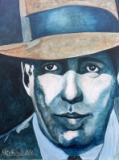Harlem Renaissance
In the early 1920's there was a movement called the "Negro" or "Harlem Renaissance". This resurgence of literature, knowledge, and the arts coming out of New York was powerful.

Ed Bradley was a suave and streetwise reporter considered one of the best interviewers on television and the winner of 19 Emmy awards for his work on "60 Minutes" and "CBS Reports. Bradley, the first African American at CBS to be a White House correspondent and a Sunday night anchor, covered a broad array of stories with insight and aplomb during his 39-year career, from war to politics to sensitive portraits of artists. He won virtually every broadcast news award and some of them more than once. As one of the most visible black journalists on television, Bradley broke down racial barriers and became a role model for young African Americans.
Ed Bradley's ability to handle hard-nosed investigations and to draw out guarded celebrities made him a star. He covered the Vietnam War, a presidential campaign and the White House and at times anchored the evening news. Bradley was a jazz-loving native of Philadelphia who rose from unpaid radio work to the most senior position on the most popular news program on TV.
Edward R. Bradley was born June 22, 1941, in a tough section of west Philadelphia, where, he recalled, his parents worked 20-hour days, with two jobs each. He graduated from what is now Cheyney University of Pennsylvania, a historically black college. Bradley taught sixth grade after college and worked at night and without pay as a disc jockey playing jazz and doing play-by-play for basketball games on WDAS-FM radio in Philadelphia.
He covered basketball games, spun records and read the news for the station until one day in the middle 1960s when he heard about the riots in Philadelphia on the radio. He offered to cover the story for WDAS and wound up reporting the event in phone call interviews with community leaders. When he returned to the station, they sent him out with a recorder. Bradley never looked back and reporting became his passion.
Ed Bradley soon landed a job at WCBS radio in New York, where he asserted himself and argued with his editor that he would not only cover black issues, he would cover all stories. After a few years, he quit his job and moved to Paris on a romantic whim soon dashed when he ran out of money. Bradley went back to his second love, reporting, and was freelancing for CBS News when they offered him a job covering the war in 1972. In Cambodia, he was hit by shrapnel in the arm and in his back in 1973 and was soon transferred to the Washington bureau to cover Capitol Hill. It was boring work to Bradley and he couldn’t wait to get back to the war. He then volunteered to cover the fall of Vietnam and Cambodia and was one of the last reporters to leave both war zones when they fell to the Communists in 1975.
Upon returning to the states, he covered the Carter presidential campaign and became White House correspondent in the Carter White House before beginning his work on "CBS Reports."
Ed Bradley's true talent was his ability to do any story and look natural doing it, whether clowning around with Robin Williams, probing company executives in an investigation or conducting sensitive interviews with bereaved people. The range of Bradley's immense talent was demonstrated almost immediately on 60 Minutes with two Emmy-Award winning interviews in his first few seasons. In the first, an insightful profile of Lena Horne, the fragile singer became so comfortable with the young Bradley, she unconsciously grabbed his hand as they walked.
Bradley built on his work with more award-winning stories for 60 Minutes for a total of 20 Emmys and recognition from all of journalism’s most prestigious awards. He won a George Foster Peabody Award for "Big Man, Big Voice" (November 1997), the uplifting story of a German singer who became successful despite significant birth defects. In 1995, he won his 11th Emmy Award for a 60 Minutes segment on the cruel effects of nuclear testing in the town of Semipalatinsk, Kazakhstan, a report that also won him an Alfred I. duPont-Columbia University Award in 1994. Also in 1994, he was honored with an Overseas Press Club Award for two 60 Minutes reports that took viewers inside sensitive military installations in Russia and the United States. In 1985, he received an Emmy Award for "Schizophrenia," a 60 Minutes report on that misunderstood brain disorder. He received an Alfred I. duPont-Columbia University Silver Baton and a 1991 Emmy Award for his 60 Minutes report "Made in China," a look at Chinese forced-labor camps, and another Emmy for "Caitlin's Story" (November 1992), an examination of the controversy between the parents of a deaf child and a deaf association.
Some of the more prominent investigative work carried out by Bradley included one of his last reports, an investigation of the Duke University lacrosse rape case, in which he broke new ground with the first interviews with the accused in a story that made headlines just last month; a report on the recalled painkiller, Vioxx, in November of 2004; an expose on the inclination of Ford Explorers with Firestone tires to roll over in crashes in 2000; a 2004 segment that reported the reopening of the 50-year-old racial murder case of Emmett Till; and a look at anti-gay feeling in the military that played a role the beating death of Pfc. Barry Winchell at Ft. Campbell, Ky., broadcast in 2003.
Ed Bradley passed away on November 9, 2006 at New York’s Mount Sinai Hospital from leukemia with his wife Patricia and friends Jimmy Buffett and Charlayne Hunter-Gault at his side. In a comment that served to evaluate his stellar career, Bradley recalled the subject of his first Emmy-winning piece for 60 Minutes: “If I arrive at the pearly gates and St. Peter said what have I done to deserve entry, I’d ask, ‘Did you see my Lena Horne story?’
Don't miss a single page. Find everything you need on our complete sitemap directory.
Listen or read the top speeches from African Americans. Read more
Read about the great African Americans who fought in wars. Read more
African Americans invented many of the things we use today. Read more
Thin jazz, think art, think of great actors and find them here. Read more
Follow the history of Black Americans from slave ships to the presidency. Read more
Olympic winners, MVPS of every sport, and people who broke the color barrier. Read more
These men and women risked and sometimes lost their life to fight for the cause. Read more
Meet the people who worked to change the system from the inside. Read more

Visit my RedBubble page and use Michael Arnold Art to create greeting cards, T-shirts, mugs, and more.

The variety and impressive numbers of mammals, birds and marine wildlife in Alaska draw visitors from all over the world. For some travelers, Alaska is wilderness, at least compared to what they may know from back home. The pristine wilderness of Alaska is, perhaps, the last vestige of thriving populations of North American wildlife. Where else can you see polar bears, bald eagles, blue and humpbacked whales, gray wolves, grizzly bears, orcas, lynx, moose, and hundreds of other rare and endangered species in their original and undisturbed natural habitats?

Enjoy our website filled with original signed acrylic paintings by award winning Artist Michael Arnold. Located in Citrus County Florida, Michael Arnold is a the editor at the Citrus County Chronicle. When he's not busy being an editor, he is an avid artist who enjoys painting in a variety of styles. We hope you take the time to click on each image to see a larger view and to learn what the artist, Michael Arnold has to say about his paintings.

As dog owners and people who care deeply for animals and wildlife, we wanted our Dog Encyclopedia to be a website that could empower pet owners to create the most positive, loving environment for their dogs. Dog Encyclopedia realizes that owning a dog is like adding a new member to your family.

Floridian Nature has everything your are looking for in Florida nature. The wildlife of Florida is rich and varied, yet most of us are familiar with only a dozen or so species: the "well known endangered species such as manatees and panthers; those, like raccoons and squirrels, that have adapted to urban environments; the frightening alligators and black bears; and those like the armadillo who can't seem to cross the road. Yet they are just a few of the many animal species found in Florida.
